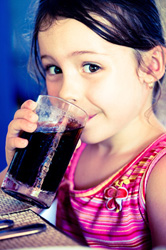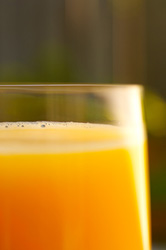Kids Twice as Likely to Drink Soda as Adults
by www.SixWise.com
The first large-scale study of its kind revealed just how much soda kids are drinking, despite nationwide attempts to get the sugary beverages out of schools.
|

Kids drink nearly twice as much soda as adults, a habit that could have a serious impact on their waistlines.
|
The study, conducted by the UCLA Center for Health Policy Research and the nonprofit California Center for Public Health Advocacy (CCPHA) in Davis, found that, in San Diego County, 46 percent of kids aged 2 to 17 drank at least one soda a day, compared to 21 percent for adults. In all of California, 49 percent of kids drank at least one soda daily, compared to 24 percent of adults.
Moreover, the study found that regardless of income or ethnicity, adults who drink one or more sodas or other sugar-sweetened beverages every day are 27 percent more likely to be overweight or obese.
Soda has gotten a bad rap over the years and has picked up the blame for several health problems ranging from diabetes to tooth decay, hyperactivity and obesity.
The dangers of these sweetened beverages begin with the ingredients. For example, the average cola contains a mix of carbonated water, caramel color, natural flavors, caffeine, phosphoric acid and high-fructose corn syrup.
One of the worst ingredients in this list is high-fructose corn syrup, which provides practically no nutritional value, but contains an abundance of calories -- and may be even worse for you than sugar. Further, recent studies have found it is often contaminated with toxic mercury!
Kids Drinking Soda Could Become Overweight Adults
Soft drinks, fruit juices and other sweet beverages (including sports and energy drinks) are almost always sweetened with HFCS. In fact, HFCS is the only caloric sweetener used in soft drinks.
When fructose is consumed, however, it "appears to behave more like fat with respect to the hormones involved in body weight regulation," explains Peter Havel, associate professor of nutrition at the University of California, Davis. "Fructose doesn't stimulate insulin secretion. It doesn't increase leptin production or suppress production of ghrelin. That suggests that consuming a lot of fructose, like consuming too much fat, could contribute to weight gain."
Many experts have, in fact, suggested that HFCS, particularly those in soft drinks, are at least partly responsible for the obesity epidemic in America.
Phosphoric acid is another ingredient that keeps soda on the top of the unhealthiest beverage list. It is a chemical added to soda to give you that zing or sour flavor at the same time breaking down starches into sugar.
However, phosphoric acid and the caffeine that’s often in soda is a combination that could be bad for your bones. While caffeine can interfere with your body's ability to absorb calcium or increase the amount it gets rid of, the acids in soda can cause your body to become more acidic -- causing it to release even more calcium.
Plus, the average can of soda has150 calories, more if you drink it in “Big Gulp” or 20-oz. size, which easily adds a hefty amount of empty calories to your diet.
What Can be Done About the “Soda Epidemic”?
|
Kick Your Soda Habit With Ajmera’s Healthy, Thirst-Quenching Alternatives!

One of our all-time favorite beverage brands, Ajmera, makes delicious and healthy beverages that give you the flavor you crave without all the extra calories and unhealthy soda additives. All four flavors are 100% natural with NO caffeine, no preservatives, no synthetic food colors and no artificial flavors:
For a limited time, buy any 4 products and receive $5 shipping, buy any 6 and receive FREE SHIPPING!
Learn More About Ajmera Beverages Now!
|
CCPHA and the UCLA Center for Health Policy Research have put together some action steps to help curb soda consumption on a personal, local, and national level. They recommend:
-
Families reduce consumption of soda and other sugar-sweetened beverages
-
Community organizations and schools limit or replace soda in vending machines and sell only healthy beverages at events attended by children and adolescents
-
Congress tax soda and other sugar-sweetened beverages and earmark the revenues for community-based prevention programs, with funds going to communities in proportion to their consumption levels
-
The Federal Trade Commission develop and implement standards for soda and other sugar-sweetened beverage advertising aimed at children under 12.
The manufacturer has slashed its price for the Wellness H2.O Bottle from $49.95 reduced to $29.95 for a limited time, so take advantage of this special offer today!
Healthy Alternatives to Soda for You and Your Kids
If you or your kids indulge in soda a little too often, keep in mind there are tasty alternatives out there that are healthy too! Next time you’re thinking of grabbing a can of pop (or letting your child have one), try:
-
Naturally flavored water, right from your own tap: You can spruce up your water by adding some non-caloric additions like a sprig of mint, slice of lemon or cucumber, frozen strawberry or lime. The options are endless! Make these creative concoctions your new healthy habit.
Water is crucial for survival -- it's the base of all your body fluids, like blood and digestive juices, it helps nutrients from your food get absorbed and be transported, and it helps eliminate waste. Even becoming mildly dehydrated (when you lose as little as 1 percent to 2 percent of your body weight) can seriously impact your body's ability to function.
How much water do you need? It's commonly said that you should drink eight eight-ounce glasses of water a day to stay healthy, but this is really just a rule of thumb, as so many factors (weather, age, activity level, health) affect how much water your body needs.
A word of caution: not all water is good for you. Tap water can be potentially contaminated with chemicals, pesticides or even pharmaceutical drugs. And bottled water, which is regulated by the Food and Drug Administration (FDA), has weaker regulations than the Environmental Protection Agency requires for tap water.
Plus, the bottles themselves often contain bisphenol-A (BPA), a chemical that mimics the female hormone estrogen, impacting fertility, reproductive health and potentially promoting cancer, heart disease, diabetes and liver problems.
To put your mind at ease and get safe, superior quality water that will promote your health rather than harm it, Sixwise.com highly recommends The Wellness Kitchen Water Filter. It reduces chlorine, chloramines, cysts, VOCs, pesticides, and herbicides below detectable levels for the life of the filter.
The Wellness Kitchen combines the best filtration and enhancement technologies to deliver the purest and most natural tasting water available. It effectively reduces harmful contaminants, while at the same time enhancing the water with adding important yet delicate wellness "ions and minerals" that your body needs.
Adding a touch of honey or Stevia to the Wellness Water right out of your tap, along with some fresh-squeezed lemon juice or pure fruit juice concentrate is a great treat. You can even freeze it as healthy popsicles!
|
The BEST Water Bottle For Your Kids to Take to School: The Wellness H2.O
The Wellness H2.O enhanced water bottle is the next evolution in water technology. Not content with merely replacing wasteful bottled water, the Wellness H2.O combines the best portable filtration technology with rare Japanese stones and a patented enhancement process to produce an unparalleled quality of water.
The Wellness H2.0 is toxin-free, with NO BPA, and filters out chlorine and other contaminants from any source -- even the water fountain in your child’s school.
-
The bottle is made of LDPE (low density polyethylene) plastic, which is BPA-free.
-
The ultimate environment product. Eliminates 1,100+ plastic bottles, reduces carbon emissions and conserves natural resources.
-
Saves you up to $1,000 in bottled water purchases per year.
-
Only bottle to produce nourishing, better-than-bottled-quality, "enhanced" water without the cost or waste associated with bottled water.
- Assures you and your family of safe and healthy water ... no matter where you go.
Discounted 40% Off for a Limited Time!
|
-
Green tea: Several studies have shown the benefits of drinking green tea, including reducing the risk of cancer, heart disease, hypertension and kidney stones. You can enjoy this tasty drink hot or cold and caffeine-free too. If you want a bit of sweetness, try adding a small amount of raw honey.
-
Ajmera’s line of all-natural delicious beverages: Opt for a 100 percent natural drink with no preservatives and no artificial flavors or colors with Ajmera Incredibles. They come in six delicious flavors:
-
Orange-O Energy contains vitamin C, an antioxidant that can protect your body from free radicals, which may cause heart disease and cancer. Vitamin C is responsible for producing collagen. Collagen is present in your muscles and bones and holds the cells together. Vitamin C also helps your immune system, helping you heal from scrapes and bruises, and keeps your gums healthy.
-
CoCo Energy is made with coconut water, which is a Natural Isotonic Beverage -- it has the same level we have in our blood, thus does not have an adverse affect on blood sugar or pressure. Coconut water contains more potassium (at about 294 mg) than most sports drinks (117 mg) and most energy drinks. It also has less sodium (25mg) whereas sports drinks have around 41mg and energy drinks have about 200 mg!
-
Mango-O Energy also contains vitamin C, giving you excellent protection against free radicals with the great flavor of mangoes!
-
Xpress Chai is creamy and delicious, and like its name implies, takes just an instant to make. The chai packets are great for taking to work or when you’re in a hurry, as you simply add hot water and your cup of tasty chai is ready. Try it in Spice, Cardamon or Plain.
-
Saffron Pistachio Milkshake: Saffron Pistachio Milkshake, also known as Thandai, is an exotic drink served during the festival of colors in India. This refreshing and healthy drink offers instant energy, keeping your body cool and mind energized.
-
Mango Milkshake contains exotic and fresh Alphanso Mangoes from India. These mangoes are rich in flavor and vitamins making them the best in the world.
-
Veggie Juice: Start off your day with high energy levels by blending your favorite vegetables in your juicer for a delicious, low-calorie drink.
-
Juice Spritzers: Soda and fruit juices contain many extra calories. You can mix your own juice spritzer by combining one or two parts seltzer, mineral water, or club soda with one part 100 percent fruit juice such as fresh-squeezed orange juice.
Recommended Reading
The Five Healthiest Beverages You Can Drink (Including Two You May Not Have Heard Of)
Are Fruit Juices Good for You or Not? The Opposing Views
Sources
California Center for Public Health Advocacy September 17, 2009
SignOnSanDiego.com September 17, 2009